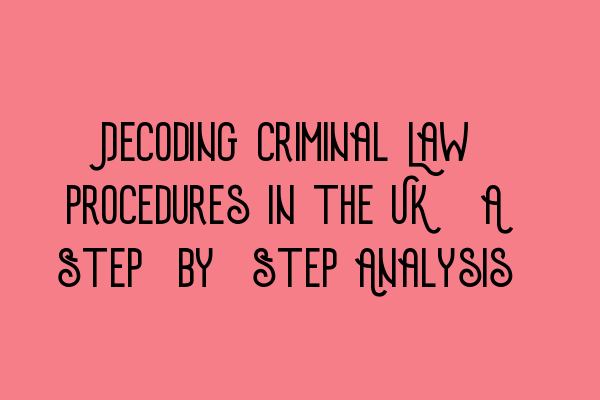Decoding Criminal Law Procedures in the UK: A Step-by-Step Analysis
Understanding criminal law procedures can be complex and overwhelming. However, with the right guidance and knowledge, navigating through the intricacies of the UK criminal justice system can become more manageable.
The Investigation Stage
The first stage in criminal law procedures is the investigation. This is when law enforcement agencies gather evidence to determine whether a crime has been committed. The investigation stage plays a crucial role in shaping the outcome of a criminal case.
During this stage, various procedures are followed, such as conducting interviews, collecting physical evidence, and conducting forensic analysis. It is important for individuals involved in a criminal case to understand their rights and obligations during the investigation process.
If you are preparing for the SQE 1 exam, it is advisable to take SQE 1 practice exam questions to assess your knowledge in criminal law procedures. These practice exams can help you familiarize yourself with the types of questions asked and improve your understanding of the subject matter.
The Charging Stage
After the investigation stage, if sufficient evidence is found, the next step is the charging stage. This is when the prosecuting authority formally accuses the individual(s) of committing a crime. The charges are typically outlined in a document called an “information” or an “indictment” depending on the severity of the offense.
Understanding the charges against you and the legal elements required to establish guilt is crucial during this stage. It is recommended to seek legal representation and engage in SQE 1 practice mocks FLK1 FLK2 to enhance your knowledge of criminal law.
The Trial Stage
If the case proceeds to trial, it is important to understand the trial stage in criminal law procedures. This is where the evidence is presented, witnesses testify, and legal arguments are made by both the prosecution and defense. The judge or jury then determines the guilt or innocence of the accused.
Preparing for the trial stage requires a strong understanding of criminal law concepts. Taking SQE 2 preparation courses can help you gain the necessary knowledge and skills to effectively navigate the trial stage of criminal law procedures.
The Sentencing Stage
If the accused is found guilty, the final stage is the sentencing stage. This is when the court determines the appropriate punishment for the crime committed. Sentencing can range from fines and probation to imprisonment or community service.
Understanding the factors that influence sentencing decisions, such as the severity of the offense, the defendant’s criminal history, and mitigating or aggravating circumstances, is crucial during this stage.
To stay updated on the latest SRA SQE exam dates and information relevant to your preparation for criminal law procedures, it is advisable to refer to reliable sources, such as SQE 1 Practice Exam Questions and SQE 1 Practice Mocks FLK1 FLK2.
In conclusion, decoding criminal law procedures in the UK requires a comprehensive understanding of each stage, from investigation to sentencing. By familiarizing yourself with the relevant legal concepts and engaging in practice exams and courses, you can enhance your knowledge and improve your chances of success in the SQE exams and beyond.
